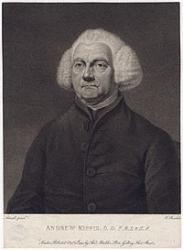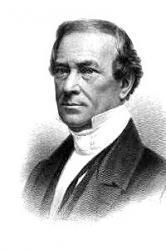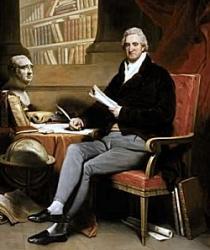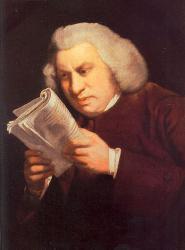
1725 - 1795 Person Name: Kippis Hymnal Number: 89 Author of "Great God! in vain man's narrow view" in A Collection of Psalms and Hymns for Christian Worship Kippis, Andrew, D.D., was born at Nottingham, March 28,1725, and educated for the ministry under Dr. Doddridge at Northampton, 1741-46. After a short residence with congregations at Boston and Dorking, he settled in London in 1753, as minister of the Princes Street Chapel, Westminster. There lie remained till his death in 1795, holding rank as the leading Presbyterian minister in the metropolis. For many years he was classical tutor at the Hoxton Academy, and afterwards at the Hackney College. He contributed largely to the Gentleman's Magazine and the Monthly Review, and edited five volumes of a new edition of the Biographia Britannica, a work commenced in 1778, and interrupted by his death on Oct. 8, 1795. His Life of Captain Cook was also published separately, and to his edition of Lardner's Works (1788) a Memoir was prefixed. His degree of D.D. was con¬ferred by the University of Edinburgh in 1767.
He was joint editor of A Collection of Hymns and Psalms for Public and Private Worship, selected and prepared by Andrew Kippis, D.D., &c. ; Abraham Rees, D.D., &c.; Rev. Thomas Jervis, and Rev. Thomas Mor¬gan, LL.D., London, 1795. This collection, commonly known as Kippis's, but sometimes as Kees's, passed through many editions, a Supplement being added in 1807, and was very generally used during the early decades of this century by congregations of Presbyterians and others, then become Unitarian in London and throughout the country [Unitarian Hymnody, § 9]. It contained 690 hymns.
The aim of the editors in their selection was to avoid “everything of a doubtful or disputable kind," and they adopt the language of Dr. Watts in the preface to his Hymns, "The contentious and distinguishing word of sects and parties are excluded." The alterations and omissions to adapt various hymns to the standard of the editors are considerable, though very little compared to what was done by others before and after them. The tone of the collection is somewhat colourless, and it gradually gave place among Unitarians to others which contained fuller and more varied expression of distinctively Christian feeling.
Two hymns by Kippis appear in this Collection.
1. Great God, in vain man's narrow view, The Incomprehensibility of God, which was generally adopted in later Unitarian books, and appears in Martineau's Hymns, 1840 and 1873.
2. How rich thy gifts, Almighty King, National Thanksgiving, which is four stanzas of the hymn, "Say, should we search the globe around," written for the thanksgiving appointed Nov. 29,1759, and appended to his Sermon on that occasion. It was given in full in Pope's Collection, 1760; and the Liverpool Octagon Collection, 1763. In Lindsey's Collection, 1774, five stanzas are given; in other early books only four, as in Kippis. The last two stanzas, somewhat altered, appear anonymously as: "With grateful hearts, with joyful tongues," in the Congregational Hymn Book, 1836, and the New Congregational Hymn Book, 1859.
[Rev. Valentine. D. David, M.A.]
--John Julian, Dictionary of Hymnology (1907)
Andrew Kippis




